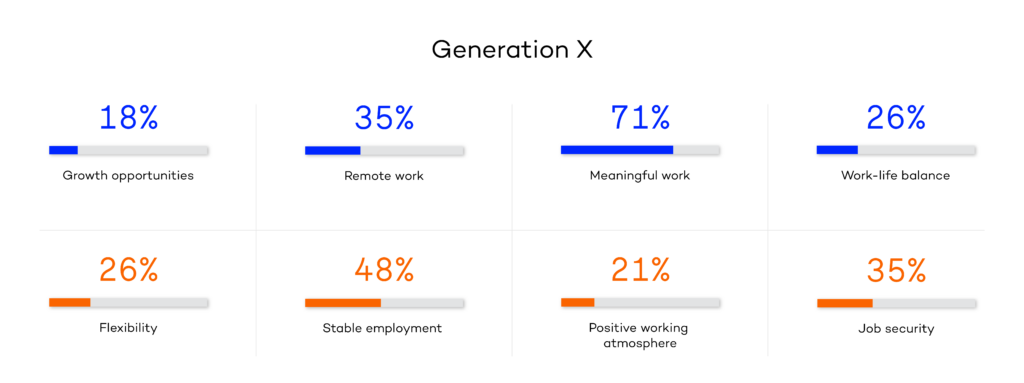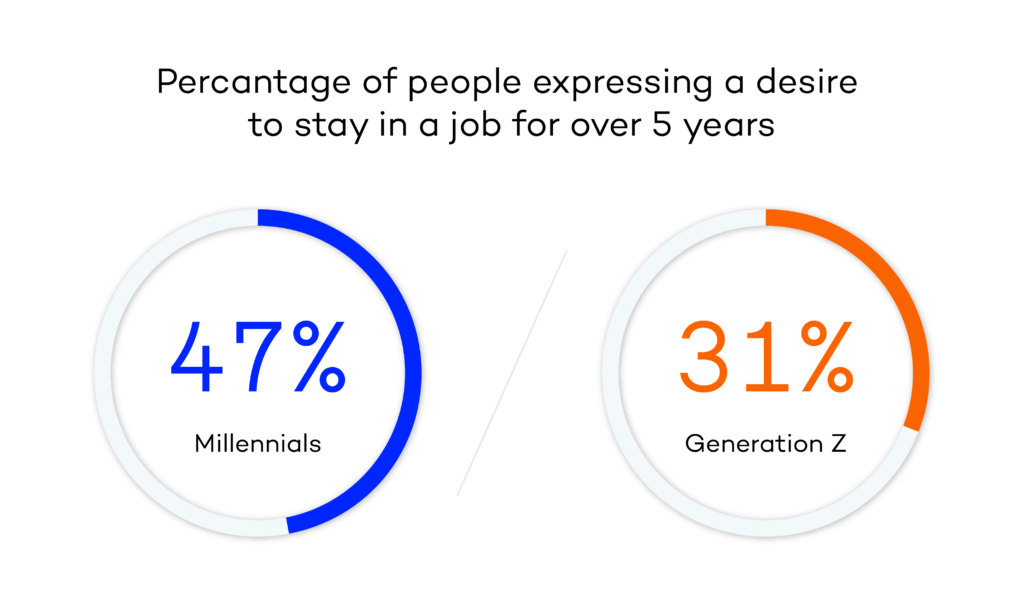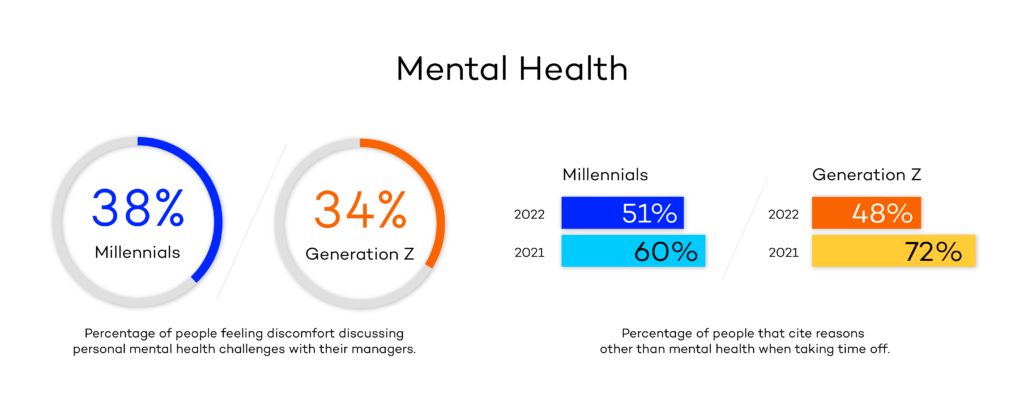Building a resilient and dynamic workforce requires attracting top talent from multiple generations. From the experienced Gen X and tech-savvy Millennials to the emerging Generation Z, companies must draw in candidates from each generation to position themselves for long-lasting success. In this blog article, we delve into the intricacies of generational recruiting, exploring the logistics that pave the way for a thriving and inclusive workforce.
Decoding the Generational Puzzle: A Guide for Recruiters
Recruiters traditionally rely on intuition and experience to navigate talent acquisition across generations. However, relying on these methods alone can perpetuate stereotypes, potentially negatively affecting results. Building a diverse workforce thus requires understanding the unique needs of each generation.
As Boomers transition into retirement, Generation X (born 1966-1980) emerges as the most experienced segment in today’s workforce. They pave the way for Millennials (born 1981-1995), who are reshaping workplace dynamics with their distinct perspectives. Generation Z (born 1995-2009), with some currently completing their education, is poised to enter the job market, mirroring Millennials in expressing their needs and preferences.

Although one might believe otherwise, these generations share more similarities than differences. Yet, some distinctions exist in the most effective strategies to attract each group in talent acquisition. Recruiters must understand these characteristics and tailor their approaches accordingly, fostering a diverse team capable of tackling challenges with a mix of backgrounds. This strategic alignment will position your company for enduring success in the constantly evolving landscape of the modern workforce.
Cracking the Code of Generation X: What Drives Their Career Choices
Generation X often gets overlooked being sandwiched between the spotlight on Boomers and Millennials, yet it’s making a significant impact on the workforce. As Boomers retire, Generation X is becoming the most senior generation, armed with extensive work experience. Despite its under-the-radar status, Generation X is notable, making up about 37% of the UK workforce.[1] Yet, despite their significance in the workforce, Generation X often gets overlooked for promotions. A 2018 Harvard survey found that only 66% of Gen X leaders received a promotion, while Millennials and Gen Z counterparts advanced more frequently in the same period.[2] This awareness, coupled with frustrations of being underrecognized, may lead to talent attrition. Thus, companies should acknowledge Gen X’s expertise and dedication to create a workplace where all generations thrive.
Generation X prioritizes stability and job security, with 48% seeking stable employment and 35% emphasizing job security.[3] Meaningful work is essential for a significant majority, with 71% desiring work that resonates with purpose. Work-life balance is crucial, as 26% prioritize it and favor schedules avoiding regular overtime.[3] Flexibility in work arrangements is valued by 26% of Generation X, with around 35% open to remote work, challenging the notion of a purely office-bound generation.[2] Creating a positive working atmosphere is important to 21% of Generation X, emphasizing the need for a supportive environment. Despite their seniority, 18% prioritize growth opportunities, showing commitment to personal and professional development.

The key to retaining Generation X is to provide flexibility and opportunities for career advancement. When recruiting, it’s crucial to cater to their needs, especially if competitors are prioritizing Millennials. By doing so, you can gain a significant competitive advantage with their wealth of experience.
Millennial Magnetism: Crafting Recruitment Strategies that Resonate
Millennials, born between 1980 and 1995, are a significant force in the workforce, currently in the midst of their careers. A recent study by Deloitte reveals that 70% are engaged in full-time employment, with 47% holding midlevel positions.[4] They also make up about 40% of the UK labor market.[1] Notably, nearly half of Millennials have become parents[4], a factor influencing their needs and preferences. Given their prominence, Millennials naturally attract considerable attention in talent acquisition efforts. To effectively engage and attract this diverse group, it’s imperative to delve into what matters most to them.
Millennials prioritize several key factors in the workplace, including work-life balance, development opportunities, meaningful work, competitive salaries, and a positive company culture.[4] Flexibility, especially in work arrangements, is crucial, with about half expressing a desire for remote work.[2] Their motivation for flexibility stems from a desire to allocate time to non-professional pursuits.[4] Despite this, once Millennials find a suitable employer, they show loyalty, with 47% in Germany wanting to stay in their current job for over five years.[4] Yet, their commitment may be influenced by concerns about the cost of living crisis, long-term financial future, and climate change.[4] Thus, stability in the workplace becomes crucial, reflecting their desire for security amid modern uncertainties.

Mental health in the workplace remains a nuanced topic for Millennials, with a level of reservation evident in discussions. According to Deloitte, 38% of German Millennials express discomfort discussing personal mental health challenges with their managers.[4] Furthermore, when needing time off for mental health reasons, 51% would give a different reason to their employer, a decrease from 60% in 2021.[4] Despite this reluctance, 45% admit to feeling burnt out due to their workload[4], highlighting the need for managers to be sensitive to potential mental health struggles. Sensitizing managers to these cues is crucial for maintaining Millennials’ well-being and productivity, fostering an environment where mental health concerns can be addressed supportively.
To effectively engage Millennials, the largest worker group, providing adaptable work arrangements and stability in the workplace is vital. Addressing anxieties about mental health and proactively monitoring signs of burnout demonstrate a commitment to their well-being. Prioritizing flexibility, stability, and mental health support creates a workplace environment that resonates with Millennials, enhancing their satisfaction, productivity, and long-term commitment to the company.
Gen Z Unveiled: Attracting Tomorrow’s Leaders Today
Generation Z is becoming a significant force in the labor market, constituting 14% of employed individuals in the UK as of 2022.[1] Many in this generation are currently transitioning from education to their professional careers, with 35% already in full-time employment and 40% still in education.[4] This data underlines the pivotal moment as Generation Z enters the workforce, bringing fresh perspectives and shaping the future professional landscape.

GenZer’s top concerns include work-life balance (29%), development opportunities (25%), meaningful work (25%), competitive salary, and positive work culture (both at 22%).[4] Notably, they appear less inclined toward long-term job loyalty, with only 31% expressing a desire to stay in a job for over 5 years, contrasting with 47% of Millennials.[4] Looking ahead, Gen Z shares similar concerns with Millennials about the future, the major ones being the cost of living crisis (29%), their long-term financial future (47%) and climate change (24%).[4] To achieve their desired work-life balance, Gen Z values flexible hours and the ability to work from home, with around 45% expressing a desire for remote work.[2]
When it comes to mental health in the workplace, Gen Z is said to pay special attention to it. Overall, 46% of Gen Z individuals feel burnt out due to their workload.[4] Surprisingly, only 34% of German Gen Zers are comfortable discussing personal mental health challenges with their direct manager.[4] Moreover, 48% prefer to cite reasons other than mental health when taking time off, which is a notable decrease from 72% in 2021.[4] As mental health discussions become more common, organizations must adapt and foster open communication channels to effectively support their workforce’s well-being.

To appeal to the preferences of the younger generation, it’s crucial to focus on continuous development and workplace flexibility. A strategic move is meeting them where they spend a significant amount of their time: on social media. Mondelez provides a notable example with an outstanding employer branding campaign on Instagram. Using an augmented-reality-based filter, the campaign connected users with the company’s sweet brands while showcasing its employer brand. This innovative approach not only caught the attention of Gen Z but also positioned the company as an employer of choice.
One Brand, Many Generations: Building an Inclusive Employer Brand
Crafting an inclusive employer brand that connects with all generations may seem daunting, but it boils down to embodying flexibility and authenticity. To foster inclusivity, it’s vital to tackle and dismantle any existing stereotypes or inequalities within the company, emphasizing a firm commitment to diversity, equity, and inclusion (DE&I). Actively seeking input from current employees about their priorities is key to shaping an authentic employer brand.
To tap into GenZer’s perspective specifically, engage with them directly through events, networking opportunities, and campus recruiting initiatives. Establishing a presence in these spaces enables you to grasp the specific preferences and expectations of the emerging workforce in your region. By staying connected and responsive to the evolving needs of each generation, your organization can build an employer brand that genuinely reflects its commitment to inclusivity and resonates with a diverse talent pool.
Expanding outreach across various channels is vital to effectively connect with all generations. Additionally, offering a diverse range of benefits is crucial. Tailoring compensation packages allows companies to target different labor market segments more effectively. Younger workers may prioritize factors like career advancement and work-life balance, while seasoned professionals often value competitive pay and comprehensive health benefits more. Recognizing and addressing the distinct priorities of various age groups ensures that your organization can attract and retain top talent across generations.
Tech-Forward Talent Acquisition: Attracting Across Generations
Expanding your candidate outreach means shifting from traditional methods to embracing modern platforms like online career sites, employee referrals, and social media. A well-designed career site improves the chances of getting applications. For instance, Galeria, a retailer with over 130 branches in Germany, revamped its career site for a better candidate experience. They used strategic SEO and Advanced Job Descriptions to provide insights into the company. The results were impressive: a 225% surge in organic site traffic and a 57% increase in the apply conversion rate. This shows the real impact of modernizing recruitment strategies.
Leveraging technology in recruitment also means tapping into the power of employee referrals. This approach lets your current workforce refer suitable candidates who fit your company’s culture and values for open positions. It’s not just for tech-savvy Gen Z; older generations also appreciate it. McDonald’s Germany is a great example of success with employee referrals. By communicating effectively during the launch, they engaged employees of all ages, leading to significant benefits. McDonald’s saw a remarkable 40% reduction in hiring costs and cut the hiring period by 50%, proving the success of employee referrals in talent acquisition.
Generational Harmony: A Unified Approach to Talent Acquisition
Emphasizing the importance of meeting the diverse needs of different generations is vital for building a workforce ready to tackle challenges. Surprisingly, priorities across generations have more common ground than expected. To attract talent from various age groups, flexibility, competitive salaries, and a positive work environment are essential. Developing an engaging employer brand and sharing it across different channels helps connect with potential candidates, regardless of their generation. This approach ensures your organization remains appealing to a wide range of talent, contributing to a resilient and diverse workforce prepared to overcome any obstacle.
Need help finding the right talent for your organization? Connect with us to explore your talent acquisition opportunities and get a headstart in your recruiting.
Sources:
1: Clark, D. (February 13, 2024). Number of people employed (aged 16-65) in the United Kingdom from 1992 to 2022, by generation. Retrieved on February 29, 2024 from https://www.statista.com/statistics/1393584/employment-figures-uk-by-generation/#:~:text=In%202022%2C%20among%20the%20working,and%204.3%20million%20Gen%20Z.
2: Goldberg, Emma. (July 7, 2023). Gen X Is in Charge. Don’t Make a Big Deal About It. New York Times. Retrieved on February 29, 2024 from https://www.nytimes.com/2023/07/07/business/gen-x-in-charge-companies-chief-executives.html
3: Zety. (2023). Generation X in the Workplace: 2022 Study. Retrieved on February 29, 2024 from https://zety.com/blog/generation-x-in-the-workplace
4: Deloitte. (2022). Deloitte Global 2022: Gen Z and Millennial Survey. Retrieved on February 29, 2024 from https://www2.deloitte.com/content/dam/Deloitte/de/Documents/Innovation/Deloitte%20Millennials%20Gen%20Z%20Survey%202022_GERMANY.pdf

















